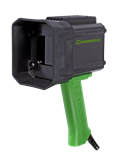ZL-425 is a water-based, water washable fluorescent penetrant used for finding indications in castings, forgings, extrusions and other materials with rough surfaces commonly found in automotive part applications. ZL-425 is an ideal solution when waste water produced during the inspection process is a concern for the operation. ZL-425 is water based and contains no petroleum distillates allowing it to drain directly into the sewage system depending on local regulations.
ZL-425 has been specifically developed for use within the automotive sector and can also be used in applications where traditional petroleum solvent-based penetrants may attack the surface, such as plastics. The penetrant features great rinse characteristics allowing it to be self-developing, so you may not need to use a separate developer depending on the application.
ZL-425 is designed to be environmentally sensitive while meeting industry approvals, including EN ISO 3452-2 and AMS 2644, and can be used in place of any conventional water-washable fluorescent penetrant.
Reduce environmental footprint and waste-water pollutants
Reliably speed up inspection and wash processes
NDT TypeFluorescent Penetrant Testing
Penetrant TypeType 1
Fluorescent Penetrant SensitivityLevel 1 - Low Sensitivity
Penetrant MethodsMethod A
Removal TypeWater Washable
Required EquipmentUV light source
Ideal ApplicationAutomotive, Ceramic components, Leak detection, Plastic components
Defect ExamplesCracks, Leaks
StandardsASME BPVC, ASTM E1417/E1417M, ASTM E165/E165M-18, ISO 3452-2, NAVSEA T9074-AS-GIB-010/271, QPL SAE AMS 2644

Water-based, water washable level 1/2 fluorescent penetrant; contains no petroleum distillates allowing direct drain disposal.

Water-based, water washable level 2 fluorescent penetrant; contains no petroleum distillates allowing direct drain disposal.
LED UV lamps and black lights for non-destructive testing

EV6000 portable, hand-held LED UV lamp for fluorescent PT and MT
Subscribe to Magnaflux NDT Blogs:
Faraday Road, South Dorcan Industrial Estate
Swindon, Wiltshire, SN3 5HE, UK
Telephone: +44 (0)1793 524566
Contact Magnaflux Customer Service
Magnaflux, A Division of ITW Limited VAT number: GB 531 8325 59